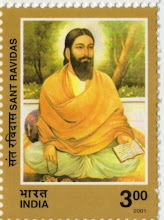Ravidas
From Wikipedia, the free encyclopedia
| Part of a series on
The Ravidasi Faith | |
 | |
| Ravidasi Beliefs & practices | |
|---|---|
| Arti | |
| Meditation · | |
| Gurdehera | |
| Guru Sikhya Sahib | |
| Topics | |
| Ravidass · | |
| Shri Guru Ravidass Jayanti | |
|
| |
| | |
| Portal: Hinduism
| |
Indian religious leader and founder Satguru of the "Ravidasi" beliefs, revered by most Hindus as a Sant, by Nirankari sect, Balmiki sect as a Guru, by Radhasoami organization as a Sant and as a Bhagat by Sikhs, which is a somewhat lesser station than that attributed to him in other faiths. He is referred to as Guru Ravidass by followers of his beliefs.
Background
Guru Ravidas was born in a village near Varanasi, in the state of Uttar Pradesh, India in 1376 CE. His father was a leather merchant. He was born in a poor family. Nonetheless he rose to a position of great honour through a life of simplicity and piety. He set an example for his followers to break the barriers set up by so called upper castes and set a philosophical and armed path for freedom. He incited his followers against cruel ruling class. He motivated his followers for a sovereign state of Begampura.
Untouchability
He was the first to motivate his followers to challenge discrimination on the grounds of caste. Because of his charismatic deeds, he has become an important figure in the Whole World, his followers calling themselves Ravidasis. He was the first to motivate his followers to make/call them untouchables who make/call them so. By his deeds he proved that he was a high caste, although others were calling him a low caste. He was the first to scientifically prove the highness of his caste.
Devotional songs
His devotional songs and verses made a lasting impact in the Bhakti movement.
अब कैसे छूटे राम, नाम रट लागी |
प्रभुजी तुम चन्दन हम पानी, जाकी अंग अंग बास समानि |
प्रभुजी तुम घन बन हम मोरा, जैसे चितवत चन्द चकोरा |
प्रभुजी तुम दीपक हम बाती, जाकी जोति बरै दिन राती |
प्रभुजी तुम मोती हम धागा, जैसे सोने मिलत सुहागा |
प्रभुजी तुम स्वामी हम दासा, ऐसी भक्ति करै रैदासा |
Translation:
- How to escape? I recite the name Ram.
- Lord, if you are sandalwood, I am water;
- with the fragrance in all parts of my body.
- Lord, if you are a cloud, I am a peacock;
- looking for you like a chakora for the moon.
- Lord, if you are a lamp, I am the wick (bAti);
- with the light burning day and night.
- Lord, if you are a pearl, I am the thread;
- together like gold and suhaga.
- Lord, you are the master and I servant;
- thus is the devotion of Raidas.[1]
Forty-one of his writings have been included in the Sikh Holy Book Guru Granth Sahib. There is also a larger body of hymns passed on independently of the Guru Granth Sahib.
Guru Ravidas is venerated in northern India, and in the Indian state of Maharashtra, in particular by the Ravidasi religion. The movement gained an extra impetus in 1920 in Punjab, due to Sikh members of the Chamar caste rebelling against continued caste oppression aimed at them. This group split from the Sikh community and joined the Ravidasi faith en-masse. Today, former Chamars from the Punjab are the largest visible ethnic group in the Ravidasi community. Punjabi Ravidasis have a number of Gurdeheras in the United Kingdom, especially in the Midlands. [2]
Legend of Ravidas Today
Today, Satguru Ravidas is very respected Hindu reformers. BJP Scheduled Caste Morcha president Bangaru Laxman (Organiser, 6-8-1995) accused Congress leader Sitaram Kesri, who had bracketed the Dalits with the minorities as "sufferers of Hindu oppression", of thereby showing "disrespect to [Dalit] saints like Ravidas, Satyakam Jabali, Sadhna Kasai, Banka Mahar, Dhanna Chamar and others who protected Hindus against foreign onslaughts." [3]
Seel also
References
- ^ Guru Ravidass Marg, Harnam Singh Lakha, Shri Guru Ravidass Sabha UK undated.
- ^ Darshan Singh Tatla, The Sikh Diaspora: The Search for Statehood, pp. 98, Routledge (199) ISBN 1-857-28300-7
- ^ Dr. Koenraad Elst?



No comments:
Post a Comment